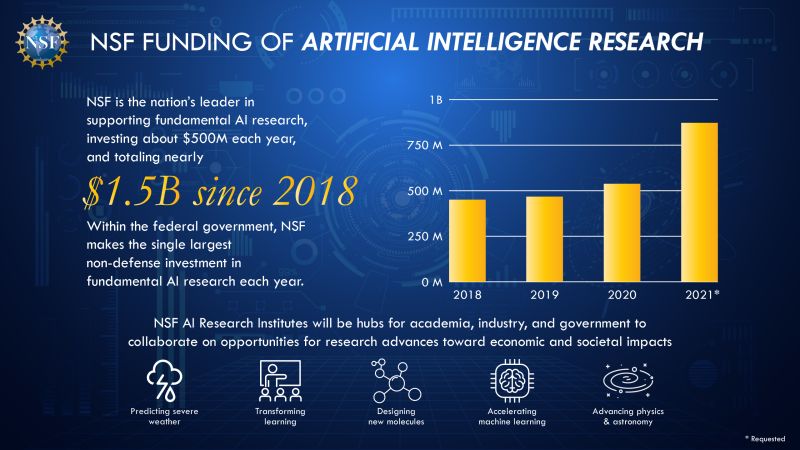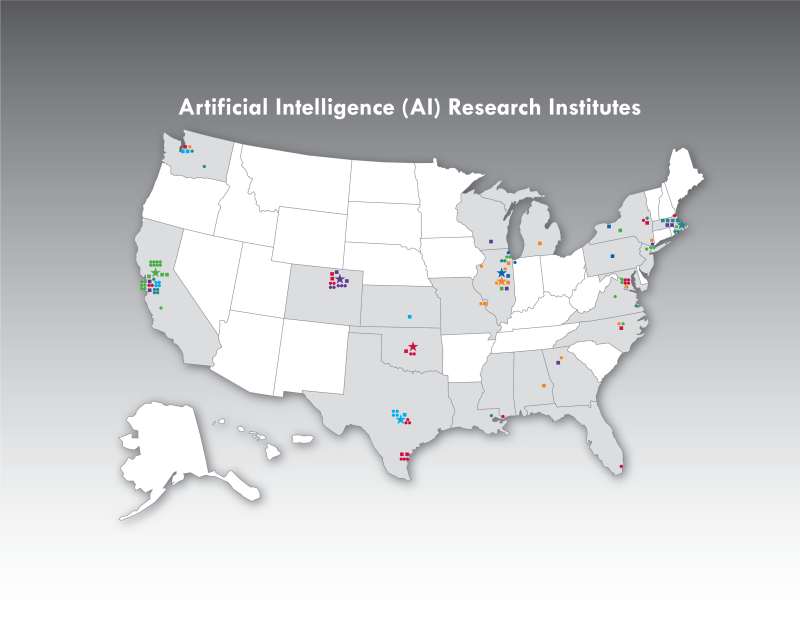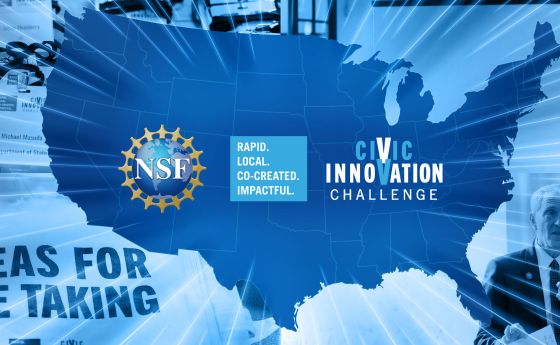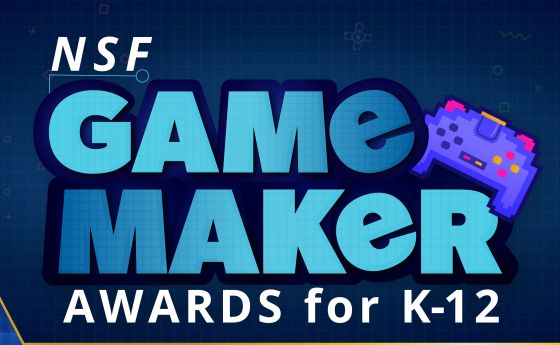
A strong S&E ecosystem depends on partnerships: Maintaining US leadership in AI
Though you may not realize it, as you scroll through the morning's headlines on your smartphone, you hold in your hands the culmination of years of federally funded academic research.
Many of a smartphone's component parts—from the touchscreen interface to its wireless connectivity—resulted from key breakthroughs made in university research labs. Years later, companies picked up these technologies, hardening the capabilities and integrating them into the device upon which we now rely.
For nearly half a century, American ingenuity has pioneered the transformations that have enabled modern digital life and its devices—like your smartphone. This ingenuity has relied on collaboration between academic faculty and students, industry researchers, and government funders. It’s what makes America’s information technology ecosystem uniquely innovative.
Research conducted at U.S. universities with federal funding, combined with industrial innovation, has led to new products that have contributed billions of dollars to economic growth and major improvements to our way of life.
As recently highlighted in the National Science Board's Vision 2030 report, to continue pushing forward the foundations of emerging disciplines like artificial intelligence, which are especially ripe for industry collaboration, new and dynamic partnerships must be created to link foundational and use-inspired research in creative, sustained ways.
As the primary non-defense federal funder of basic AI research, the U.S. National Science Foundation is working to do exactly that—to build robust partnerships with industry across sectors that are committed to accelerating the transition of foundational discoveries into American innovation.
In recent years, NSF partnerships have taken significant steps toward improving the foundational capabilities of AI, including machine learning, an important subfield that lies at the heart of a number of key AI applications. NSF has collaborated with DARPA on novel hardware systems enabling real-time machine learning; with the multi-stakeholder nonprofit Partnership on AI on sociotechnical AI systems; with Amazon on fairness in AI; and with Intel Corporation on machine learning for wireless networking systems. Just last week, NSF led the establishment of seven new AI Research Institutes that rely on partnerships across government, academia and industry to make a big impact on both AI and society. More broadly, NSF-led public-private partnerships are supporting the deployment of four advanced wireless research platforms, city-scale testbeds that allow for experimental research on next-generation wireless concepts, technologies and applications. A consortium of more than 35 companies and associations are providing $50 million in cash and in-kind contributions, matching an NSF investment of $50 million, to support these testbeds, which will help ensure continued U.S. leadership in future wireless.
New partnerships and funding opportunities
Today, NSF is announcing the launch of a new funding opportunity for the next round of AI Research Institutes. In addition to collaboration with other federal agencies like the U.S. Department of Agriculture's National Institute of Food and Agriculture, NSF is pleased to be partnering directly with industry—Accenture, Amazon, Google and Intel—to provide more than $160 million to fund approximately eight new AI Research Institutes next year, in the following areas:
-
Human-AI Interaction and Collaboration: Enabling people to collaborate with intelligent machines toward common goals, based on fair and transparent principles that can be understood by users, and in increasingly complex interactions and contexts. Partial support provided by Amazon and Google.
-
AI Institute for Advances in Optimization: Integrating perspectives from both classical constrained and unconstrained optimization for solving previously “impossible” large-scale problems in planning, resource allocation, strategic reasoning, network and system design and optimization, hardware and software design and verification, and general combinatorial optimization and search. Partial support provided by the Intel Corporation.
-
AI and Advanced Cyberinfrastructure: Integrating advanced cyberinfrastructure and AI as essential components of modern scientific discovery, to accelerate the ability to address pressing grand challenges in science and engineering and as a key enabler for advancing AI research and practice.
-
Advances in AI and Computer and Network Systems: Exploring transformative ideas on how AI techniques can be used to advance computer and network systems, and how advances in computer and network systems can improve AI applications in the context of addressing long-standing as well as emerging challenges in computer and network systems.
-
AI Institute in Dynamic Systems: Supporting research and education in fundamental AI and machine learning theory, algorithms, and use-inspired engineering and science for real-time sensing, learning, decision making and predictions that lead the way towards safe, reliable, efficient, and ethical data-enabled engineering and science systems.
-
AI-Augmented Learning: Supporting research and development of AI-driven innovations to radically improve human learning and education writ large—in formal and informal settings, toward a grand challenge of “Education for All” through research on AI-supported learning systems to radically expand learning access to all Americans and in response to the rapidly changing landscape of jobs and work. Partial support provided by Accenture.
-
AI to Advance Biology: Seeking bold AI-based advances and information infrastructure to push the frontiers of biology, increase our understanding of complex systems, and provide a theoretical basis for original research across the biological sciences.
-
AI-Driven Innovation in Agriculture and the Food Systems: Advancing AI with application throughout agriculture and food production systems to overcome today’s major challenges in agriculture, build new multidisciplinary communities, and create the workforce needed for an AI-powered revolution in agriculture. This Institute theme is funded by USDA NIFA.
These institutes, which will be selected through NSF’s longstanding and rigorous merit review process, will serve as nodes in a broader national AI research and education network and will spawn new “centers” of AI leadership that will individually and collectively have major impact on societal concerns and needs.
This collaboration spanning government, industry and eventually academia will provide immense value all around. By aligning objectives and resources, partners will work to advance science and technology toward visionary goals.
Industry partners will motivate use-inspired research and help researchers accelerate the transition of research to market through a number of resources ranging from expertise and financial backing to infrastructure and access to datasets that will drive AI innovation. The institutes and their rich partnerships will also support NSF's goal of expanding the “geography of innovation” by fostering regional and national networks of innovation and workforce training.
NSF will help industry partners connect to the research community by identifying which lines of research hold the most promise through its gold-standard process of merit review. These connections will enable experiential education for today’s students, serving as a springboard to their future career paths.
And most importantly, researchers working at the eventual AI Research Institutes will be able to continue to publish and license technologies, just as they would if supported through any other NSF award or program, contributing to the advancement of the nation’s AI industry.
Just as past innovations like the transistor and laser have transformed present technological capabilities, today’s investments in AI will enable breakthroughs across nearly every sector of society, well into the future. And just as past breakthroughs have been enabled by multidisciplinary, multisector collaborations, NSF is pioneering new partnerships to secure and maintain American innovation in AI.
We invite you to join us! If you are interested in applying to the new National AI Research Institutes funding opportunity, see the program solicitation. And if you're interested in partnering with NSF to support future institutes, please send an email to ai-partnerships@nsf.gov.







